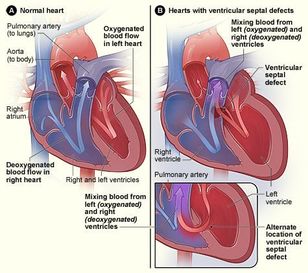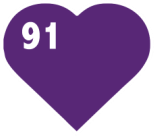
Sometimes it seems hard to believe but we’ve now screened over 14,000 hearts! Besides that impressive number, the more crucial 'why' you need to know factors that lead to SCA is that 1 in 7 people screened show some type of abnormality, sometimes life threatening - 1 in 42 people screened!
High Blood Pressure: To date we've had approximately 705 participants with seriously high blood pressure. This one should come as no surprise, considering how often we hear about it. Hypertension affects as many as 1 in 4 American adults and can increase your risk of developing heart disease and stroke. Treating high blood pressure can be as simple as modifying your diet and exercise in some cases. Others may need some help from beta blockers or other medication.
Possible HCM: Hypertrophic Cardiomyopathy (HCM) is a disorder we talk about frequently because it's what took Sharon's son, Anthony Bates, from us far too soon. It often goes undiagnosed because people will show few if any symptoms. Many people can go on to live perfectly normal lives with this diagnosis, however, for others, it can cause the thickening of heart muscles that lead to shortness of breath, chest pain or problems in the heart’s electrical system. We've found more than 244 potential cases of HCM to date.
Genetic Dysfunctions: This generally pertains to holes in the heart (Patent ductus arteriosus, Atrial septal defect and Ventricular septal defect). We’ve found 41 holes in the heart throughout the years. These holes can happen at different places in the heart and lead to different problems. Some of these defects may not require treatment, they can even close on their own as you grow. These holes can put additional stress on your heart and lungs and could also lead to fluid build up. All people with this type of defect should be followed by a cardiologist in the event any complications develop.
ECG/EKG Anomalies: With over 500 anomalies found, an abnormal ECG/EKG can mean any number of things, which is why we refer you to a specialist when we see one! Sometimes, an abnormal EKG could just be a normal variation of your heart’s rhythm. Other times it could mean that your heart has some sort of blockage or it’s working harder to pump blood.
Other more serious complications include Wolff-Parkinson-White (WPW) syndrome and Long QT Syndrome. WPW is an extra electrical pathway in your heart that can cause rhythm problems. Though some people may never experience symptoms, a disruption to the heart’s rhythm can also lead to sudden cardiac arrest. This is a fairly rare disorder, but we’ve found it in nearly 20 screening participants! Long QT syndrome is another electrical issue that can lead to rapid and erratic heartbeats. These episodes can trigger fainting, seizing, even sudden death.
Most people who come to our screenings are completely healthy, but nothing beats the peace of mind that comes with an expert's opinion. You just never know what dangers may lie underneath a seemingly healthy surface; perhaps a "ticking time bomb" in your chest!
That's 'why' your support, at this holiday season, is so crucial to helping our mission; to spare another family the unbearable pain of losing a child or loved one before their time. Every $100 donated helps us screen another child's heart and pay for needed new equipment so we can "screen more young hearts and save more young lives!"
Want to have YOUR heart screened? Check out our events and schedule an appointment today!
And, by the way, you can make a tax deductible donation right on our homepage. That's 'what' you need to know as well. You already know 'why'!
High Blood Pressure: To date we've had approximately 705 participants with seriously high blood pressure. This one should come as no surprise, considering how often we hear about it. Hypertension affects as many as 1 in 4 American adults and can increase your risk of developing heart disease and stroke. Treating high blood pressure can be as simple as modifying your diet and exercise in some cases. Others may need some help from beta blockers or other medication.
Possible HCM: Hypertrophic Cardiomyopathy (HCM) is a disorder we talk about frequently because it's what took Sharon's son, Anthony Bates, from us far too soon. It often goes undiagnosed because people will show few if any symptoms. Many people can go on to live perfectly normal lives with this diagnosis, however, for others, it can cause the thickening of heart muscles that lead to shortness of breath, chest pain or problems in the heart’s electrical system. We've found more than 244 potential cases of HCM to date.
Genetic Dysfunctions: This generally pertains to holes in the heart (Patent ductus arteriosus, Atrial septal defect and Ventricular septal defect). We’ve found 41 holes in the heart throughout the years. These holes can happen at different places in the heart and lead to different problems. Some of these defects may not require treatment, they can even close on their own as you grow. These holes can put additional stress on your heart and lungs and could also lead to fluid build up. All people with this type of defect should be followed by a cardiologist in the event any complications develop.
ECG/EKG Anomalies: With over 500 anomalies found, an abnormal ECG/EKG can mean any number of things, which is why we refer you to a specialist when we see one! Sometimes, an abnormal EKG could just be a normal variation of your heart’s rhythm. Other times it could mean that your heart has some sort of blockage or it’s working harder to pump blood.
Other more serious complications include Wolff-Parkinson-White (WPW) syndrome and Long QT Syndrome. WPW is an extra electrical pathway in your heart that can cause rhythm problems. Though some people may never experience symptoms, a disruption to the heart’s rhythm can also lead to sudden cardiac arrest. This is a fairly rare disorder, but we’ve found it in nearly 20 screening participants! Long QT syndrome is another electrical issue that can lead to rapid and erratic heartbeats. These episodes can trigger fainting, seizing, even sudden death.
Most people who come to our screenings are completely healthy, but nothing beats the peace of mind that comes with an expert's opinion. You just never know what dangers may lie underneath a seemingly healthy surface; perhaps a "ticking time bomb" in your chest!
That's 'why' your support, at this holiday season, is so crucial to helping our mission; to spare another family the unbearable pain of losing a child or loved one before their time. Every $100 donated helps us screen another child's heart and pay for needed new equipment so we can "screen more young hearts and save more young lives!"
Want to have YOUR heart screened? Check out our events and schedule an appointment today!
And, by the way, you can make a tax deductible donation right on our homepage. That's 'what' you need to know as well. You already know 'why'!

 RSS Feed
RSS Feed